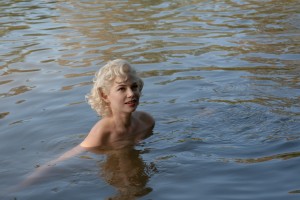‘My Week with Marilyn’ Dazzles Audiences as the Buxom Blonde Herself Once Did
Though Marilyn Monroe died in 1962, she never ceased to captivate the world with her beauty, talent, and rollercoaster of a personal life. Director Simon Curtis’ film My Week with Marilyn, based on Colin Clark’s two memoirs (The Prince, the Showgirl, and Me, and My Week with Marilyn), documents the star’s vibrancy, unreliability, and friendship with Clark (played by Eddie Redmayne).
Clark, a 23-year-old just out of Oxford University in 1956, is determined to be involved in movie production. When family friend, Sir Lawrence Olivier (Kenneth Branagh), agrees to help him get a job on the set of his new production The Prince and the Showgirl, Marilyn Monroe’s (Michelle Williams) presence on the set isn’t the last thing on his mind, but it isn’t the first either. After finagling his way into the position of Third Assistant Director, otherwise known as a “gofer” and least the important job on the set, Clark is brimming with confidence and gratitude. However, he does not fathom what happens next. Ms. Monroe, the biggest and arguably most beautiful actress in Hollywood, takes a liking to the young movie-set slave.
In Curtis’ adaptation, many of the British actors on Olivier’s set do not understand the difficult actress. She often fails to show up to work, and when she does, she frequently lacks the confidence and composure to get through her scenes. Olivier refuses to take her seriously, and she is regarded as a dumb blonde. Each member of her American crew attempts to exert control over the star by feeding her pills and feeding into her insecurities. To make matters worse, there are problems between Monroe and her new husband, playwright Arthur Miller (Dougray Scott). Clark seems to be the only person who can calm Monroe. He can sometimes even convince the notoriously late movie star to get to work early.
Summing up Olivier and Monroe’s rivalry, Clark notes their different but similar goals in one meaningful sentence: “It’s torture for you because you’re a great film star who wants to be a great actress and its torture for him because he’s a great actor who wants to be a great film star.”
It is as if Monroe shines once again on screen through Williams’ performance. Though she does not look exactly like the star (her body lacking the drastic hour-glass figure Monroe was known for), she captivates the audience with the spontaneity and sex appeal that the buxom blonde exerted. The costumes are fitting— Williams dons the whites, beiges, and blacks that we often picture Monroe wearing, as well as the lounging bathrobe she is said to have worn all day when out of the public eye. Williams, who has Monroe’s signature wiggling walk down to a t, also displays her playfulness and emotionality in two brief nude scenes. With the helpful direction from Curtis, she portrays Monroe as skinny-dipping and embracing life with wild passion one minute and reclusive the next. Williams majestically carries Monroe’s confidence in sexuality and her sensitivity to the world to an audience nearly 50 years after her death.
Milton Greene (Dominic Cooper), Executive Producer of The Prince and the Showgirl, and Monroe’s ex-lover, says of her work, “When Marilyn gets it right, you just don’t want to look at anyone else.” This is true of Williams as Monroe as well. The character is so breathtakingly dynamic that scenes without her fill the audience with anticipation of her return to the screen.
Redmayne as Clark is on point too. Clark’s eagerness on Olivier’s set shines through his green eyes and freckled face, adding to the innocence of the youth he is portraying. Though Clark and Monroe share a few kisses, and Clark undoubtedly falls under the goddess’s charm, their friendship can hardly be considered an affair. Clark, though years younger than Monroe, is in a position to see both sides of the situation and serves mainly as the paranoid actress’s confidant.
However, the film does stray from Clark’s memoir. It is not as honest — perhaps to add more detail to the account. In his memoirs, Clark did not want to fall in love with Monroe. He dawdled between wanting to save the melancholy star and attempting to keep his distance. While they shared a kiss or two, he insisted with Monroe, himself, and everyone around him that they were friends and nothing more. The film sugarcoats the story, portraying Clark as more of a puppy dog around Monroe; completely captivated and nearly helpless under her power, he tries to convince her to leave Hollywood for his love.
My Week with Marilyn focuses on a side of Monroe that documentaries often miss—her innocence, her desperation to be taken seriously as an actress, and the control the film industry attempted to exert on her personal life. The film does not delve into her psychological issues, but focuses on the blip she was in Clark’s life—a short week of Monroe’s warmth, spontaneity, and breakdowns.
Rating: 3.5 out of 4











